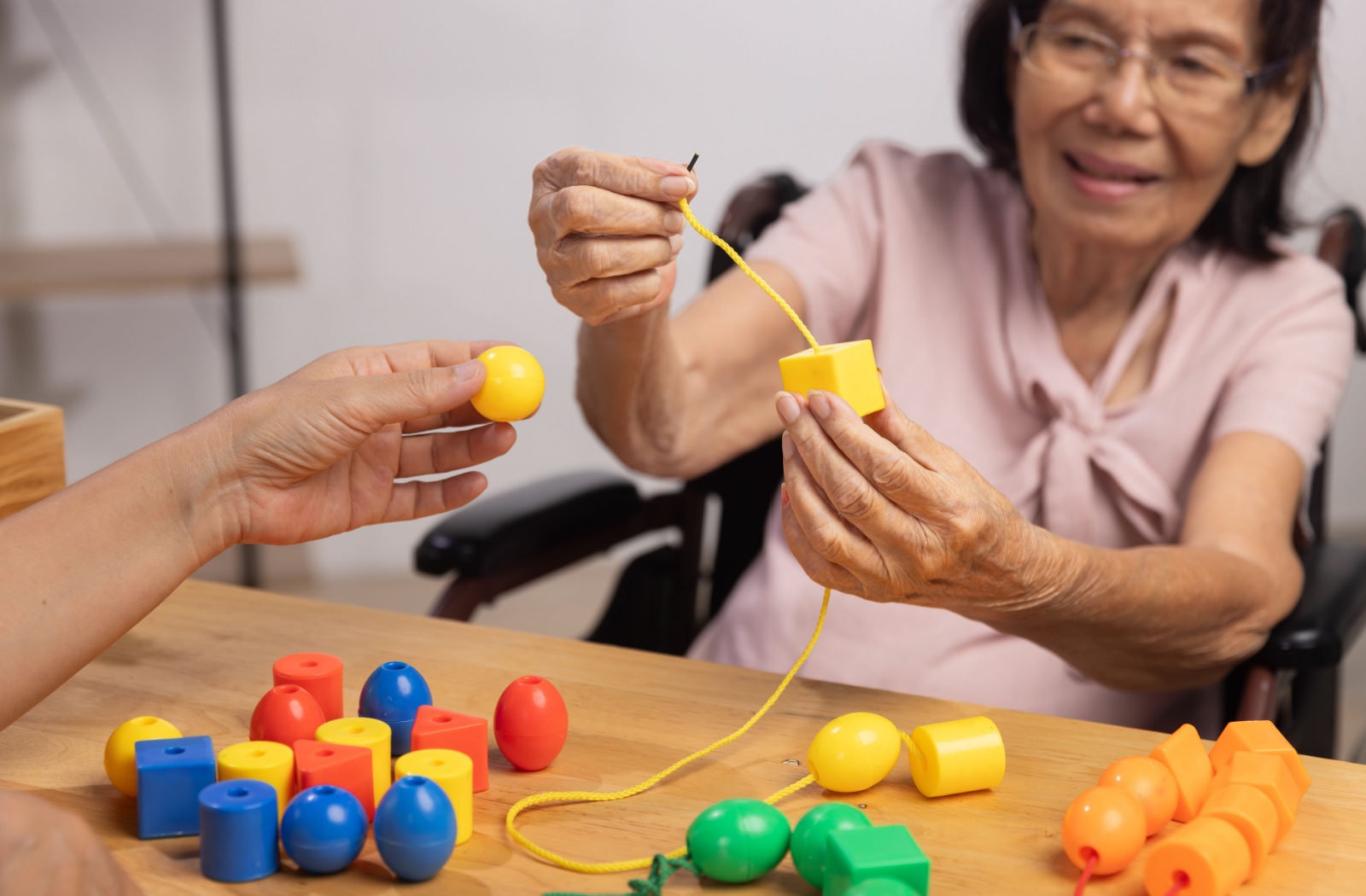Key Takeaways
- Memory games can help older adults stay mentally active and support cognitive strength.
- Simple card games like matching, solitaire, and group activities offer easy, familiar ways to practice recall.
- Word puzzles, storytelling, trivia, music-based games, and photo activities help engage long-term memory.
- Starting with familiar activities and offering gentle encouragement can make home-based memory games more enjoyable.
- These activities help promote connection, confidence, and routine for residents while supporting ongoing mental engagement.
The Benefits of Memory Games for Seniors
Keeping your mind active becomes increasingly important as you age. Memory exercises can be a helpful part of that process, especially when they’re enjoyable and easy to fit into your routine. Many families explore memory games as a way to help their loved ones maintain cognitive strength, spark conversation, and stay engaged.
Memory games provide mental stimulation, social interaction, and enjoyable routines that can easily become part of your daily life. These simple, familiar activities can support memory function and create meaningful moments every day. For older adults, this can be an incredible way to boost cognitive abilities, memory, and more.
Simple Card Games That Support Memory Function
Memory plays an important role in daily life, helping older adults stay confident and independent. As people age, it’s normal for recall, attention, and processing speed to change. However, continued mental stimulation can help support cognitive health. So, what games are particularly ideal for older adults?
Classic Matching Games
Matching games are easy to set up and helpful for practicing recall. By placing cards face down and pairing them from memory, older adults can challenge their cognitive skills at a comfortable pace. You can start with fewer cards and increase the difficulty as they feel ready.
Solitaire Variations
Solitaire encourages focus, planning, and visual memory. Whether your loved one prefers using a traditional deck of cards or a tablet-based version, the game offers steady mental exercise without feeling overwhelming.
Group Card Activities
Playing cards with family members or friends provides both mental and social benefits. Simple games like Go Fish or matching-style activities work well for older adults and naturally lead to conversation and connection.
Crossword Puzzles and Word Searches
Word games help sharpen vocabulary and strengthen recall. Many seniors enjoy crosswords, word searches, or fill-in-the-blank puzzles because they offer a calm, familiar way to challenge the mind at any time of day.
Storytelling and Memory Sharing
Sharing personal stories—whether about childhood, family traditions, or meaningful life moments—encourages long-term memory recall. These conversations often deepen family connections and help older adults feel seen and heard.
Trivia Games About Past Decades
Trivia based on music, movies, or cultural moments from your loved one’s younger years can uncover positive memories. These activities often create lighthearted conversations and help your loved one engage with long-term memory in a comfortable way. Even better, trivia games offer significant cognitive benefits for older adults, all while being a fun activity.
Name That Tune Activities
Music can evoke strong emotional connections. Playing a few notes of a familiar song or humming a melody can help your loved one identify titles, recall years or events, or simply enjoy reminiscing.
Photo Memory Games
Looking through old photographs encourages memory recall and opens the door to storytelling. Whether you use a family album or a shared digital photo folder, these moments can be grounding and meaningful.

Helping Your Loved One Get Started With Memory Activities at Home
Finding the right approach to memory activities can help your loved one stay engaged without feeling pressured. Start slowly, focus on enjoyment, and make it easy for them to participate at their own comfort level.
To help your loved one get started, it helps to:
- Choose games they already enjoy or recognize.
- Begin with simple activities and increase the challenge gradually.
- Keep materials—like cards, puzzles, or photos—easily accessible.
- Offer to participate together to make activities more social.
- Create a quiet, well-lit space free from distractions.
- Encourage small, consistent routines rather than long sessions.
A gentle, flexible approach helps create positive experiences while keeping the brain active.
How Memory Activities Fit Into Senior Living Communities
Senior living communities often incorporate memory-supportive games into their daily programming. These activities are engaging, but they’re also an important part of lowering the risk of cognitive decline. That’s why communities like ours offer:
- Group card games and trivia sessions that strengthen recall and encourage social interaction
- Music-based activities that tap into emotional memory and spark meaningful moments
- Guided reminiscence programs using photos, familiar objects, or storytelling prompts
- Small-group puzzles or word activities tailored to different comfort levels
- Creative projects that support focus and self-expression
- Regularly scheduled events that promote routine, confidence, and daily engagement
These activities help residents stay mentally active while also giving families meaningful ways to connect during visits.
The Value of Memory Support in Senior Living
At The Barrington at Hioaks, our programming includes engaging activities designed to support cognitive health while fostering community connections. We understand that every person has unique interests and needs, and we work to create programming that reflects those individual preferences.
Here in our community, we’re ready to welcome your loved one to their new home. We can offer them a true home where they’ll always have the support they need to thrive. Schedule a visit with us today to learn more about our community and the support we provide.














